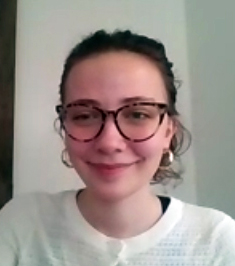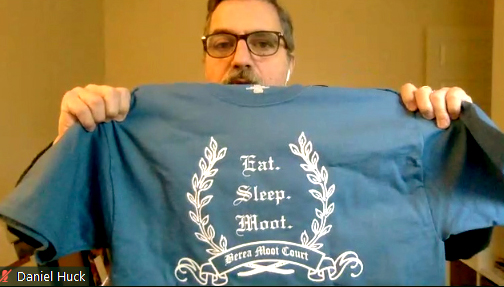Sarah Schroan ’20 and Gabriella Epley ’21 won second place in the national brief writing competition held by the American Moot Court Association (AMCA). Sarah and Gabriella averaged 91.5 points from the judges on a 100-point scale. More than 1,000 paired undergraduates competed from more than 100 institutions, including Yale, Duke, University of Chicago, University of Pennsylvania, and many more.

“On a practical level winning this award is hopefully going to help me get into law school,” Gabriella said. “But I think it also proved to all of us on the team that Berea can compete on a national level, and we do really well if we work together as a team. We really proved we were competitive on a larger scale than just Berea or Kentucky or in the East or South.”
This competition was only the second national AMCA competition for Berea’s Moot Court team, and the first time a team from the College has competed in the brief writing portion of the competition.

Berea’s Moot Court students began studying and analyzing a simulated “case problem” in May 2020. The problem included 20 decisions of the Supreme Court of the United States (SCOTUS) and other courts that were relevant to analyzing the impact of the First Amendment. This year’s case focused on the refusal of a wedding planner to provide services to an LGBTQ couple, and students had to apply the relevant legal precedents to support each side of the argument in a format replicating the real-world SCOTUS process. The national competition provides parallel tracks for students, one for student pairs to compete in oral advocacy and the other to compete in writing legal briefs. Both tracts are conducted as if the participants were presenting before the actual Court.
“Student pairs had to certify in writing they received no outside help (nobody but the two of them) once they began preparing their brief together, and I had to certify the same as their coach,” said Dr. Daniel Huck, associate professor of general studies and Moot Court coach. “Their finished brief was submitted anonymously to the AMCA with no school affiliation included, those identifiers revealed only once all scoring was completed.”
Panels comprised of lawyers, judges and law-school professors with experience and expertise in U.S. Constitutional law evaluated the briefs. The format and substance of each brief had to meet the requirements used in actual SCOTUS cases.
In short, there is no element of chance in the briefing competition because either student co-authors know how to analyze and apply challenging legal concepts to complex facts, or they do not. Sarah and Gabriella know how.
Dr. Daniel Huck, Associate Professor of General Studies
“They say the best student briefs each year are indistinguishable from the real written submissions of experienced lawyers arguing before SCOTUS,” Dr. Huck said. “In short, there is no element of chance in the briefing competition because either student co-authors know how to analyze and apply challenging legal concepts to complex facts, or they do not. Sarah and Gabriella know how.”
Gabriella and Sarah, along with other moot court teammates Valentino Torres ’21, Natalie McAninch ’21, Trevean Hall ’22, and Olivia Mbugua ’22, spent innumerable hours in preparation for the AMCA competition, meeting via Zoom calls for several hours, multiple days a week beginning in late spring and throughout the fall semester. These student issue teams were part of the Law, Ethics and Society course Berea offers, which teaches students how to advocate well orally and in writing as a lawyer.
“What’s amazing,” Gabriella said, “is that we didn’t have class in first mini session (of the fall semester), and everyone showed up and read the cases. It was not part of a grade, we were not getting credit, but everyone showed up.”

Sarah and Gabriella were both quick to give credit to the individuals who helped them earn this honor.
“If I didn’t have my issue team this year, we would not be here,” Sarah said. “When we are in issue group that’s where the hard work happens. That’s where we are coming up with arguments and critiquing each other. The group is a sounding board to talk about what will work and not work well.”
In addition, Berea professors, professors at the University of Kentucky College of Law, lawyers who work in Lexington and College donors contributed to enable Berea’s team to participate in competitions like AMCA.
“They did not learn strong analysis and writing only after signing up for Moot Court,” Huck said. “Instead, those abilities are the long-term product of many faculty members who honed these students’ thinking and writing abilities across many semesters. Credit for their strong work ethic and focused time management (both essential to Moot) also must derive in part from their service with various labor supervisors over time at the College.”

